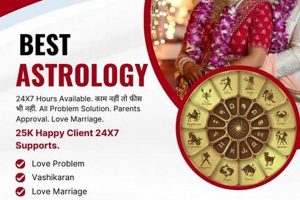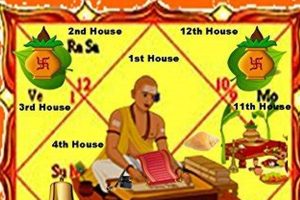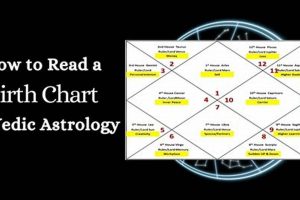Software and online tools designed to estimate lifespan based on Vedic astrological principles analyze birth charts, planetary positions, and specific combinations believed to indicate longevity or potential health challenges. These tools often consider factors like the ascendant, the position of the Moon and Saturn, and the strength of the 8th house (associated with longevity and transformation) in a natal chart. An example might be a program that calculates a predicted lifespan range based on the positions of Mars and Saturn at the time of birth.
While the concept of predicting mortality remains controversial, the interest in such tools reflects a broader human desire to understand life’s trajectory. Historically, astrology has played a role in advising individuals about potential life events, including health and lifespan. In the context of Vedic astrology, these calculations are not meant to be fatalistic predictions, but rather potential indicators that can encourage proactive health management and self-reflection. The underlying philosophy emphasizes the interconnectedness of cosmic energies and individual lives.
Further exploration of the methodologies employed by these calculators, the ethical implications of life predictions, and the limitations inherent in such approaches will provide a more nuanced understanding of this complex subject. The following sections delve into the astrological principles involved, the accuracy and reliability of such predictions, and the potential benefits and drawbacks of utilizing these tools.
Tips for Approaching Life Predictions
Interpreting lifespan estimations requires careful consideration and a balanced perspective. These tips offer guidance for navigating this complex subject.
Tip 1: Consult Qualified Astrologers: Automated calculations should be viewed as supplementary tools. Consultation with experienced Vedic astrologers offers personalized interpretations and considers nuanced factors not readily captured by algorithms.
Tip 2: Focus on Holistic Wellbeing: Rather than fixating on predicted lifespans, prioritize health-promoting practices. These include balanced nutrition, regular exercise, stress management, and mindful living.
Tip 3: Recognize Limitations: Astrological calculations offer probabilities, not certainties. Life expectancy is influenced by numerous factors, including genetics, lifestyle, and unforeseen circumstances.
Tip 4: Avoid Fatalistic Interpretations: Predictions serve as potential indicators, not predetermined outcomes. Empowerment comes from utilizing this information to make proactive choices regarding health and wellbeing.
Tip 5: Understand Karmic Influences: Vedic astrology emphasizes the role of karma. Predictions can be viewed as reflections of past actions, offering opportunities for personal growth and positive change.
Tip 6: Consider the Birth Chart Holistically: Longevity estimations are just one aspect of a comprehensive birth chart analysis. Other planetary influences and combinations play crucial roles in shaping an individual’s life path.
Tip 7: Research Different Astrological Systems: Various traditions within Vedic astrology may employ different methodologies for lifespan calculations. Exploring diverse perspectives can provide a broader understanding.
By approaching life predictions with discernment and a focus on holistic wellbeing, individuals can gain valuable insights into their potential and make informed choices to enhance their lives.
In conclusion, understanding the complexities of lifespan estimations requires a balanced perspective that combines astrological insights with practical wisdom and a focus on healthy living.
1. Birth Chart Analysis
Birth chart analysis serves as the cornerstone of Vedic astrology death prediction calculators. These calculators function by interpreting the planetary positions at the moment of birth as depicted in the birth chart. The chart acts as a cosmic blueprint, mapping celestial influences believed to shape an individual’s life, including potential lifespan. Specifically, the placement of planets like Saturn, Mars, the Moon, and the ascendant, along with the strength of the 8th house (associated with longevity), are key factors considered in these calculations. For example, a debilitated Saturn in the 8th house might be interpreted differently than an exalted Saturn in the same house, potentially impacting the predicted lifespan.
The significance of birth chart analysis lies in its capacity to provide a personalized assessment. While generalized astrological principles apply, individual birth charts offer unique insights. The interplay of various planetary positions and aspects creates a complex tapestry of influences, making birth chart analysis an essential step. For instance, while the position of Mars might suggest a certain predisposition, the influence of Jupiter aspecting Mars could modify that indication. This intricate interplay underscores the need for comprehensive chart analysis rather than isolated planetary interpretations.
In essence, accurate birth chart analysis is paramount for meaningful lifespan estimations using Vedic astrological methods. It provides the individualized context necessary to interpret planetary influences and calculate potential longevity. While the subject of predicting mortality remains complex and contested, the birth chart serves as the primary tool for navigating this area within the framework of Vedic astrology. Understanding the specific configurations within an individual’s chart is therefore crucial for any interpretation related to life expectancy, offering a personalized lens through which to approach this sensitive subject.
2. Planetary Influences
Planetary influences form the core of Vedic astrology death prediction calculators. These calculators interpret the positions and interactions of celestial bodies at the time of birth to assess potential lifespan. The underlying premise is that planetary energies exert specific influences on individual lives, including health and longevity. Understanding these influences is crucial for interpreting the results generated by such calculators.
- Malefic Planetary Placements:
Certain planetary positions are traditionally considered unfavorable for longevity. For example, a debilitated Saturn in the 8th house, or Mars conjunct with the Moon in specific houses, could be interpreted as potentially reducing lifespan. However, it’s crucial to note that these are general interpretations and require further analysis considering the entire birth chart.
- Benefic Planetary Aspects:
Conversely, benefic planetary influences can mitigate potential negative impacts. For instance, a strong Jupiter aspecting a challenging Saturn placement might reduce its negative influence on longevity. These mitigating factors underscore the interconnectedness of planetary influences and the need for comprehensive chart analysis.
- The Role of the Lunar Nodes:
The lunar nodes, Rahu and Ketu, also play significant roles in Vedic astrology. Their placement in relation to other planets, particularly in the 8th house, can influence longevity estimations. For example, Ketu in the 8th house could be interpreted differently based on its conjunctions and aspects.
- Planetary Periods and Sub-periods (Dasha and Bhukti):
Vedic astrology utilizes planetary periods and sub-periods (known as Dasha and Bhukti) to assess the timing of potential life events. Certain planetary periods, particularly those ruled by planets associated with challenges or transformation, might be considered significant when evaluating longevity. Analyzing these periods within the context of the birth chart is crucial for a comprehensive understanding.
By analyzing these interconnected planetary influences, Vedic astrology death prediction calculators attempt to provide insights into potential lifespan. However, these calculations are not deterministic. A holistic interpretation of the birth chart, including an assessment of mitigating factors and the overall planetary balance, is essential for a nuanced understanding. Further exploration into specific planetary combinations and their interpretations is necessary for deeper comprehension.
3. Longevity Calculations
Longevity calculations represent a core function of Vedic astrology death prediction calculators. These calculations aim to estimate potential lifespan based on astrological principles, specifically the planetary positions at birth. While controversial and not considered definitive predictions, they provide a framework for understanding potential life trajectories within the Vedic astrological system. Exploring the methodologies and interpretations behind these calculations offers valuable insights into this complex area.
- Ashtakavarga System:
The Ashtakavarga system, a point-based method assessing planetary strength in different houses, plays a significant role in longevity calculations. A higher score generally suggests more favorable outcomes regarding longevity. For instance, a strong score for benefics in the 8th house could be interpreted positively. This system offers a quantitative approach to assessing planetary influences on lifespan.
- Vimshottari Dasha System:
The Vimshottari Dasha system, a planetary period system, provides a timeline for potential life events. Analyzing the planetary periods and sub-periods associated with challenging placements, particularly in relation to the 8th house, offers insights into potential vulnerabilities and periods of transformation. For example, a challenging Mars period during a weak 8th house period might be considered significant.
- Specific Planetary Combinations:
Certain planetary combinations are traditionally associated with longevity or potential health challenges. For instance, the conjunction of Mars and Saturn in specific houses might be interpreted negatively, while a strong Jupiter aspecting these planets could mitigate the impact. Understanding these combinations provides a deeper understanding of how specific planetary interactions influence lifespan estimations.
- Analysis of the 8th House:
The 8th house, associated with longevity, transformation, and unexpected events, plays a crucial role. The strength of this house, the planets placed within it, and the aspects it receives significantly influence longevity calculations. A strong 8th house with benefic influences is generally considered favorable for longevity. Analyzing this house provides specific insights into potential challenges and strengths related to lifespan.
These facets of longevity calculations within Vedic astrology death prediction calculators offer a complex and nuanced perspective. It’s crucial to remember that these calculations are not definitive predictions but rather interpretations of potential influences. A comprehensive analysis considering all these factors, combined with a holistic view of the entire birth chart, is essential for a balanced and meaningful understanding. Further exploration into the specific methodologies employed by different astrological traditions can provide additional insights.
4. Karmic Implications
Vedic astrology integrates the concept of karma, suggesting actions in past lives influence present circumstances, including lifespan. “Vedic astrology death prediction calculators,” while not definitively predicting death, incorporate karmic indicators within their algorithms. Understanding these karmic implications offers a deeper perspective on the philosophical underpinnings of these calculations and their potential interpretations. Exploring these connections provides valuable insights into how karma is factored into these astrological tools.
- Prarabdha Karma:
Prarabdha karma, the portion of past karma manifesting in the present life, is considered a significant factor influencing longevity. Planetary placements, particularly in the 8th house (associated with longevity and transformation), are interpreted as reflecting prarabdha karma related to lifespan. For example, challenging planetary positions in the 8th house might be interpreted as indicating karmic debts related to past actions influencing present life expectancy. This connection highlights how past actions are believed to manifest in present circumstances, according to Vedic astrology.
- Sanchita Karma:
Sanchita karma, the accumulated karma from past lives, represents the reservoir of karmic potential. While not directly influencing current lifespan, sanchita karma provides context for understanding the origins of prarabdha karma. For instance, a challenging prarabdha karma related to health might be understood as stemming from a larger pool of accumulated karmic patterns related to actions impacting wellbeing. This concept emphasizes the interconnectedness of past actions and present experiences.
- Kriyamana Karma:
Kriyamana karma, actions performed in the present life, creates future karma. While Vedic astrology death prediction calculators focus on past karma, present actions can modify its expression. Positive actions, particularly related to health and wellbeing, are believed to mitigate potential negative karmic influences. This underscores the potential for agency and change despite pre-existing karmic patterns.
- Planetary Indicators of Karmic Debts:
Specific planetary placements and combinations are interpreted as indicators of karmic debts related to past actions. For instance, Saturn, often associated with karmic lessons and restrictions, placed in the 8th house might be interpreted as a karmic indicator requiring attention to unresolved issues. Understanding these indicators provides a framework for exploring potential karmic influences on longevity and health within the context of Vedic astrology.
By integrating these karmic concepts, Vedic astrology death prediction calculators offer a more nuanced interpretation of potential lifespan, extending beyond mere planetary placements. The karmic perspective suggests that longevity is not solely predetermined but influenced by past actions and subject to modification through present choices. This interconnectedness of past, present, and future actions within the context of lifespan estimations provides a richer understanding of the philosophical underpinnings of these astrological tools.
5. Ethical Considerations
Ethical considerations are paramount when discussing Vedic astrology death prediction calculators. The potential impact of such predictions on individuals’ psychological well-being necessitates careful examination. Disseminating predictions without proper context or sensitivity can cause undue anxiety, fear, or despair. Responsible astrological practice requires prioritizing client welfare and avoiding deterministic pronouncements. For example, presenting lifespan estimations as fixed outcomes rather than potential indicators can be ethically problematic. Balancing predictive insights with empowering guidance is crucial for ethical practice. A real-life example might involve an individual making drastic life changes based on a misinterpreted prediction, highlighting the potential for harm if ethical considerations are disregarded.
Furthermore, the accuracy and reliability of these calculators pose significant ethical challenges. Promoting unverified claims or guaranteeing specific outcomes can mislead individuals seeking guidance. Transparency regarding the limitations of astrological predictions is essential. Ethical practitioners acknowledge the probabilistic nature of these calculations and refrain from presenting them as absolute truths. For instance, advertising a calculator as providing definitive life expectancy predictions raises ethical concerns. Instead, emphasizing the potential insights and limitations of such tools fosters responsible usage and informed decision-making. Additionally, exploiting vulnerable individuals seeking answers about mortality raises serious ethical questions. Responsible astrological practice requires avoiding predatory practices and prioritizing client well-being over financial gain.
In conclusion, ethical considerations are integral to the responsible use of Vedic astrology death prediction calculators. Balancing predictive insights with ethical practice requires sensitivity, transparency, and a focus on client welfare. Avoiding deterministic pronouncements, acknowledging limitations, and prioritizing informed consent are crucial for navigating the complex ethical landscape surrounding these tools. Promoting responsible usage and safeguarding vulnerable individuals are paramount for maintaining the integrity of astrological practice. Ultimately, ethical considerations should guide the development, application, and interpretation of these calculators to ensure they serve as tools for self-awareness and empowerment rather than sources of anxiety or misinformation.
Frequently Asked Questions
This section addresses common queries regarding lifespan estimations derived from Vedic astrological principles.
Question 1: How accurate are Vedic astrology death prediction calculators?
Lifespan estimations based on Vedic astrology are not definitive predictions. They offer potential indicators based on planetary positions at birth, interpreted through specific astrological principles. Numerous factors influence longevity, and these calculators provide one perspective among many.
Question 2: Can these calculators predict the exact time of death?
No, pinpointing the exact time of death is beyond the scope of these calculators. They offer potential lifespan ranges, not precise moments. Interpreting these estimations as fixed predictions is a misapplication of astrological principles.
Question 3: Should one make life decisions solely based on these predictions?
Relying solely on lifespan estimations for major life decisions is strongly discouraged. These calculations offer one perspective among many factors influencing life choices. A balanced approach considering personal values, practical circumstances, and professional advice is recommended.
Question 4: What is the role of karma in lifespan estimations?
Vedic astrology integrates the concept of karma, suggesting past actions can influence present circumstances, including potential lifespan. These calculations often incorporate karmic indicators, interpreted through planetary positions and specific astrological combinations.
Question 5: Are there ethical concerns regarding the use of these calculators?
Ethical considerations are crucial. Presenting lifespan estimations as definitive predictions can cause undue anxiety and distress. Responsible astrological practice emphasizes the probabilistic nature of these calculations, prioritizing client well-being and informed consent.
Question 6: How can one approach these predictions responsibly?
A balanced perspective is essential. Viewing these estimations as potential indicators rather than fixed outcomes promotes a healthier approach. Consulting with qualified Vedic astrologers for personalized interpretations and focusing on holistic well-being are recommended.
Understanding the limitations, ethical implications, and potential benefits of these calculators fosters responsible usage. A balanced approach integrating astrological insights with practical wisdom empowers informed decision-making and promotes holistic well-being.
Further exploration into specific astrological principles and methodologies can provide a more nuanced understanding of this complex subject.
Conclusion
Exploration of Vedic astrology death prediction calculators reveals a complex interplay of astrological principles, karmic concepts, and ethical considerations. These tools, based on birth chart analysis and planetary influences, offer estimations of potential lifespan, not definitive predictions. Methodologies like the Ashtakavarga and Vimshottari Dasha systems provide frameworks for calculating longevity, while the 8th house and specific planetary combinations hold particular significance. Integrating karmic implications suggests past actions influence present circumstances, impacting potential lifespan. Ethical considerations underscore the importance of responsible usage, avoiding deterministic interpretations and prioritizing client well-being.
Lifespan estimations serve as potential indicators, not fixed pronouncements. Integrating these insights with practical wisdom, healthy lifestyle choices, and consultation with qualified astrologers empowers informed decision-making. Further research and open dialogue regarding the methodologies, limitations, and ethical implications of these calculators are crucial for navigating this complex and sensitive subject. A balanced approach fosters a deeper understanding of the interplay between astrological insights, individual agency, and the multifaceted nature of human existence.







